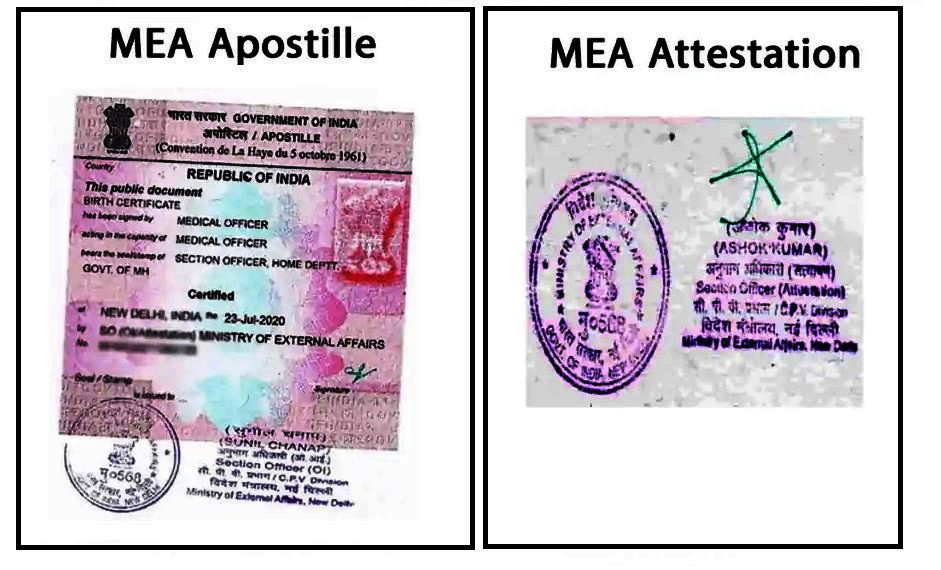MEA Attestation and MEA Apostille
A Detailed Guide to MEA Attestation and MEA Apostille
What is MEA Attestation and Why Do You Need It?
MEA (Ministry of External Affairs) Attestation is a critical step in the process of document verification in India. It is necessary to authenticate documents issued in India to be recognized and accepted in foreign countries.
What is MEA Attestation?
MEA document attestation is required right after the certificate is attested by the respective state HRD (Human Resource Department). The Ministry of External Affairs attests various types of documents, including:
- Personal Documents: Birth certificates, marriage certificates, etc.
- Educational Documents: Degrees, diplomas, and school certificates.
- Commercial Documents: Business agreements, power of attorney, etc.
MEA Attestation Process Steps
- Notary Attestation: Local notary verifies the document.
- State Authentication: Relevant state authorities authenticate the document.
- MEA Attestation: MEA verifies and stamps the document, ensuring its authenticity before embassy attestation.
Importance of MEA Attestation
- Global Recognition: Ensures documents are accepted internationally.
- Legalization: Confirms legal standing of documents abroad.
- Proof of Authenticity: Validates that documents are genuine.
Why Do You Need MEA Attestation?
- Overseas Employment: To confirm the authenticity of your documents for jobs abroad.
- Higher Education: Universities abroad require attested educational certificates.
- Migration: Essential for personal documents needed for immigration.
- Business: Necessary for establishing business operations abroad.
- Legal Purposes: Required for legal proceedings and transactions in foreign countries.
Difference Between MEA Attestation and MEA Apostille

MEA Attestation and MEA Apostille are both processes to verify documents, but they serve different purposes and are recognized differently internationally.
MEA Attestation
- Purpose: To authenticate documents for use in countries that are not part of the Hague Convention.
- Process: Documents are verified by local notary, state authorities, and finally by the Ministry of External Affairs (MEA).
- Recognition: Accepted in countries that require traditional document attestation.
MEA Apostille
- Purpose: To authenticate documents for use in countries that are part of the Hague Convention.
- Process: Documents are verified by local notary, state authorities, and then get an Apostille sticker from the MEA.
- Recognition: Recognized in all Hague Convention member countries, simplifying the legalization process.
Key Differences
Scope:
- MEA Attestation is for countries not in the Hague Convention.
- MEA Apostille is for countries in the Hague Convention.
Verification Mark:
- MEA Attestation involves multiple stamps from different authorities.
- MEA Apostille involves a single square-shaped, computer-generated sticker unique to the document..
Summary of Stamps in MEA Attestation
- Local Notary Stamp
- State Authentication Stamp:
- State Home Department or GAD for personal documents.
- State Education Department (HRD) for educational documents.
- Chamber of Commerce for commercial documents.
- MEA Attestation Stamp
This multi-step process ensures that the documents are thoroughly verified and authenticated for use in foreign countries that require traditional attestation.
Conclusion
Use MEA Attestation if your destination country is not a member of the Hague Convention. Use MEA Apostille if your destination country is a member, as it streamlines document acceptance.
How Does Apostille Simplify Document Verification?
Apostille simplifies document verification by providing a single, recognized stamp that confirms the document’s authenticity. Instead of getting multiple stamps from different offices, you just need this one special sticker. It’s like a universal pass that makes sure your documents are accepted in over 100 countries. This reduces the hassle and speeds up the process of using your documents abroad, making it easier for you to study, work, or live in another country.
Which Countries Accept Apostille?
Countries that are members of the Hague Convention accept apostille. There are over 100 such countries, including the United States, United Kingdom, Australia, Germany, and Japan. These countries have agreed to recognize the apostille stamp, which means your documents don’t need further legalization to be used there. This agreement helps people move, work, and study more easily across borders by ensuring their documents are quickly and universally recognized.
Types of Documents That Need Apostille
Many types of documents can need an apostille, including:
- Personal Documents: Birth certificates, marriage certificates, divorce decrees, death certificates.
- Educational Documents: Degrees, diplomas, transcripts.
- Commercial Documents: Business agreements, powers of attorney, invoices.
These documents need to be verified to be used abroad. The apostille stamp confirms that they are genuine and can be trusted in other countries. Whether you are a student, professional, or business owner, apostille helps your documents cross borders smoothly.
Steps to Get an Apostille in India
Getting an apostille in India involves a few steps:
- Notary Attestation: First, a local notary verifies your document.
- State Authentication: Next, the document is authenticated by the relevant state department (HRD for educational documents, Home Department for personal documents).
- MEA Apostille: Finally, the Ministry of External Affairs applies the apostille sticker.
This process ensures that your document is genuine and can be trusted in other countries. It’s like a series of checks to make sure everything is in order before you get the official approval.
Time Required for Apostille
The time required to get an apostille can vary depending on the type of document and the state where it needs to be authenticated. Generally, the process can take anywhere from a few days to a couple of weeks. The initial notary and state authentication might take a few days each, and the MEA apostille process usually takes a couple of days. It’s important to plan ahead and allow enough time to complete the process before you need to use your documents abroad.
Cost of Apostille
The cost of getting an apostille can vary based on several factors, including the type of document and the services used to process it. Generally, there are fees for the notary attestation, state authentication, and the MEA apostille itself. Additionally, if you use a third-party service provider to handle the process, there will be service charges. The total cost can range from a few hundred to a few thousand rupees. It’s a good idea to check the exact fees with the relevant authorities or service providers before starting the process.
Validity of an Apostille
An apostille does not have a set expiration date; it remains valid as long as the document itself is valid. For example, a birth certificate or a degree with an apostille will remain valid indefinitely. However, some documents, like police clearance certificates or medical reports, might have their own validity periods. In such cases, the apostille is only valid as long as the document is considered current. It’s important to check the validity requirements of the specific document you are apostilling.
Difference Between Apostille and Attestation
Apostille and attestation are both methods of verifying documents, but they serve different purposes:
- Apostille: For use in countries part of the Hague Convention. It involves a single apostille sticker from the MEA and is recognized internationally.
- Attestation: For use in countries not part of the Hague Convention. It involves multiple stamps from notary, state authorities, and MEA, followed by the embassy of the destination country.
Apostille simplifies the process for Hague Convention countries, while attestation is more extensive for other countries.
Can You Apostille Digital Documents?
As of now, apostille is generally applied to physical documents, not digital ones. You need to submit original or certified copies of your documents for apostille. The process involves physical stamps and stickers, so digital documents need to be printed and then verified through the usual steps (notary, state authentication, and MEA apostille). However, some countries and authorities are exploring digital apostille solutions for future use, but it’s always best to check the current requirements
Apostille for Personal Documents
Personal documents that often need an apostille include birth certificates, marriage certificates, divorce decrees, and death certificates. These documents are crucial for proving your identity, marital status, or family relationships when moving abroad. To get an apostille for personal documents, first get a notary attestation, then have the document authenticated by the State Home Department or General Administration Department, and finally, obtain the MEA apostille. This ensures your personal documents are trusted and accepted in foreign countries.
Apostille for Educational Documents
Educational documents like degrees, diplomas, and transcripts often require an apostille for studying or working abroad. The process ensures that your academic qualifications are recognized internationally. To get an apostille for educational documents, first get a notary attestation, then have the document authenticated by the State HRD (Human Resource Department), and finally, obtain the MEA apostille. This process confirms that your educational documents are genuine and can be trusted by foreign universities or employers.
Apostille for Commercial Documents
Commercial documents such as business agreements, powers of attorney, and invoices might need an apostille for international trade or business operations. The process ensures that your business documents are recognized and trusted abroad. To get an apostille for commercial documents, first get a notary attestation, then have the document authenticated by the Chamber of Commerce, and finally, obtain the MEA apostille. This helps your business operate smoothly in foreign countries by ensuring your documents meet international standards.
Conclusion
Apostille is essential for using documents internationally in Hague Convention countries. It simplifies the verification process, saving time and hassle. Understanding the process, costs, and requirements helps ensure your documents are accepted abroad, whether for personal, educational, or business purposes.




